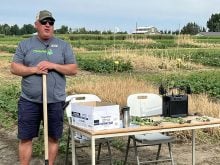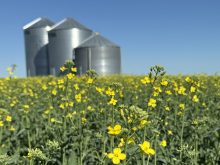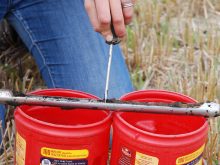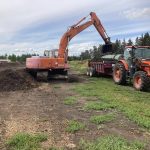If Diane Woodworth goes ahead with her plan to grow and sell medicinal herbs, she’s going to do it organically.
In a booming market, people who grow plants that heal will find buyers whether their product is registered organic or not.
But for Woodworth, there is no compromise.
“It’s a health thing, and I don’t mind if it means I have to be out there with a hoe all day,” said Woodworth, whose family farms near Deloraine, in southwestern Manitoba.
Woodworth rubbed shoulders with other prospective growers at an event marking the opening of the Medicinal and Aromatic Plant Association of Manitoba in Carberry last week. It was a good opportunity to pick up last minute tips before her echinacea, feverfew and valerian seeds go in the ground.
Read Also

AI expected to make itself felt in food systems
Artificial intelligence is already transforming the food we eat, how farmers produce it and how it reaches the consumer, experts say
She has an auto-immune disease some experts say is connected to the use of chemicals on her family’s farm.
Her family doctor diagnosed the condition, but it was Woodworth’s optometrist who made the connection between chemical exposure and her body’s refusal to fight a common eye infection.
There is no treatment for the disease which lowers white blood cell counts and compromises the body’s immune system. Woodworth’s doctor said her condition should run its course in a few years.
The herb grower said she wasn’t surprised by the suggestion her illness could be related to chemical exposure.
“We’re oilseed and cereal growers so there’s chemicals on the farm. I spray my grass for weeds with chemicals.
“This is a small community where planes are spraying crops and you walk out the door and catch a drift.”
Consumers also concerned
Woodworth said she made the choice to grow her plants free of synthetic chemicals, pesticides and herbicides for herself, but also for the growing number of consumers who want to restrict the amount of toxins in their food.
Aside from the health aspect, she knows organic products will fetch a higher price on the herbal medicine market. The premiums are sometimes double the price of herbs grown with the aid of chemicals, according to David Neufeld, manager of the organic producers’ association of Manitoba.
“Consumer demand is moving in that direction, all the analysts will say that,” Neufeld said.
“If people grow medicinal herbs conventionally they may be able to find buyers but they won’t get as good a price.”
People in the market for herbal medicines are often either health conscious or dealing with medical problems already, Neufeld said.
“When people have compromised health they’re saying what is the point of myself putting more product in that will compromise my immune system further.”
Clayton Jackson, an herb market researcher with the Manitoba Crop Diversification Centre, agrees.
“If people are taking herbs for their health they don’t want to take anything that’s been chemically grown.”
But becoming certified as an organic grower can be a lengthy process, Neufeld warned potential producers during the field trial demonstration in Carberry, Man.
Once a grower applies, the association reviews the application and passes it on to an independent inspector to visit the farm. Land exposed to chemicals in the past must be clean for four years before it can be certified.















